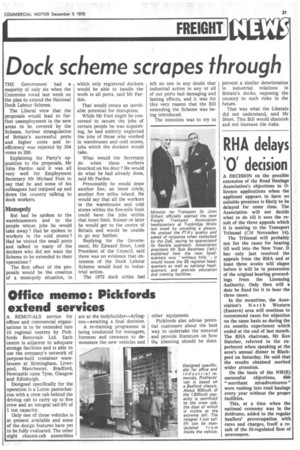Dock scheme scrapes through
Page 23

If you've noticed an error in this article please click here to report it so we can fix it.
THE Government had a majority of only six when the Commons voted last week on 'the plan to extend the National Dock Labour Scheme.
The Liberal view that the proposals would lead to further unemployment in the new areas to be covered by the Scheme, further strangulation of Britain's successful ports and higher costs and inefficiency was rejected by 294 votes to 288.
Explaining his Party's opposition to the proposals, Mr John Pardoe said it was all very well for Employment Secretary Mr Michael Foot to say that he and some of his colleagues had traipsed up and down the country talking to dock workers.
Monopoly
But had he spoken to the warehousemen and to the people whose jobs he would take away ? Had he spoken to workers in the cold stores ? Had he visited the small ports and talked to many of the dockers who did not want the Scheme to be extended to their operations ?
The first effect of the proposals would be the creation of a monopoly situation, in which only registered dockers would be able to handle the work in all ports, said Mr Pardoe.
That would create an inevitable potential for disruption.
While Mr Foot might be concerned to secure the jobs of certain people he was supporting, he had entirely neglected the jobs of those who worked in warehouses and cold stores, jobs which the dockers would take.
What would the Secretary do when these workers knocked on his door ? He would do what he had already done, said Mr Pardoe.
Presumably he would draw another line, an inner circle, another five miles inland. He would say that all the workers in the warehouses and cold stores within the five-mile limit could have the jobs within that inner limit. Sooner or later he would get to the centre of Britain and would be unable to go any farther.
Replying for the Government, Mr Edward Short, Lord President of the Council, said there was no evidence that extension of the Dock Labour Scheme would lead to industrial action.
The 1972 dock strike had left no one in any doubt that industrial action in any or all of our ports had damaging and lasting effects, and it was for this very reason that the Bill extending the Scheme was being introduced.
The intention was to try to prevent a similar deterioration in industrial relations in Britain's docks, exposing the country to such risks in the future.
That was what the Liberals did not understand, said Mr Short. This Bill would diminish and not increase the risks.


































































































































